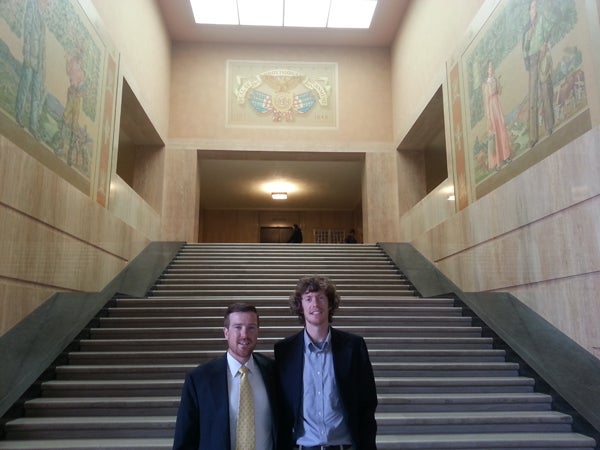While many Oregonians read about the work being done by the 77th Oregon Legislative Assembly trying to balance the budget, debate tax credits, and Public Employees Retirement System (PERS) reform, or address education funding, PPPM graduate students Joe McAndrew and David McKay are immersed in the legislative process through internships with different entities.

McAndrew, a second year Master of Community and Planning (MCRP) student, is a government relations intern with Lobby Oregon, focusing on public transportation issues. McKay, a second year Masters of Public Administration (MPA) student, is interning for Governor John Kitzhaber’s energy policy adviser Margi Hoffman.
Both agree their internship experiences have furthered their policy interests and expanded their skills. “My educational experience at the UO has certainly benefited from my internship,” says McAndrew. “While department courses provide a foundation of knowledge for a career in public service, it is internships such as this that have tested my lessons and put them to work, both for my own career development and for the public good.”
McKay agrees. “I am very interested in energy policy and the economics behind our state’s shift to cleaner, renewable energy. The final stages of Governor Kitzhaber’s 10-Year Energy Action Plan presented an opportunity for me to get involved in energy policy development in Oregon. Fortunately, I was able to receive an internship in his office, which gives me access to the plan’s development and insight to the political processes that shape it.”
The internships provide McAndrew and McKay a unique perspective on the public policy realm and allow them to directly contribute to Oregon’s policy development. While these internships provide these two students exceptional opportunities to expand their education and gain practical, real-world lessons in their chosen career fields, Hoffman sees a broader benefit.
“Helping to grow the next generation work force is incredibly important to Governor Kitzhaber,” says Hoffman. “His commitment to growing the next generation of innovative Oregonians spans from the macro to the micro—fundamentally transforming the education system to involving people like David in the work that we do on a daily basis. We are only as strong as the next generation.”
McAndrew had previous experience working for a U.S. Congressman from Iowa before enrolling in the MCRP program. His current internship allows him to work directly with Lobby Oregon’s president, Doug Barber, to represent the policy interests of health care organizations and the Lane Transit District (LTD). His internship responsibilities include tracking more than 70 bills for LTD and following legislative hearings on these bills. Additionally, McAndrew attends client government relations committee meetings and provides weekly updates on bills of interest before the legislative assembly.
“Joe had experience working in the U.S. Congress so he understands the legislative process,” says Barber. “But the Oregon Legislature is more informal and legislators are more accessible. I think it was eye opening for Joe, to see how easily, sometimes, you can drop in on legislators or check with them in the halls to find out information or let them know about an issue. The rules in every state are a little different, so understanding the quirks in the system, and figuring out how to use them to benefit your client is part of the process.”
McKay has been interning for Hoffman, Kitzhaber’s energy policy adviser, since the beginning of fall term. In the fall he worked to answer public comments submitted to the Energy Action Plan’s draft proposal. He is currently conducting policy research and analysis to aid in the plan’s implementation.
“David added tremendous value to our efforts from day one,” says Hoffman. “He has strong analytical, research, and writing skills, which enables him to jump right into the deep end of the pool. I think what has been most valuable for David is figuring out how to apply those skills in a real-world situation. It is the difference between functioning in a purely analytical environment and overlaying politics on top of it.”
McKay started working with on the 10-year energy plan proposal after the public comment period for the draft plan had closed. “David's assistance in reviewing the comments, determining where we needed additional research, changes, or more thinking enabled us to deliver a comprehensive final product that took into account each of the 1,200 comments we received,” Hoffman says. “It is critical in drafting a comprehensive energy strategy for Oregon that we meaningfully engage the public and incorporate their feedback into the plan.”
McAndrew and McKay’s experiences are ultimately a win-win-win for all involved: The students gain unparalleled professional development and policy knowledge not available within UO classrooms; the PPPM and A&AA receive a unique opportunity to raise their profiles throughout Oregon; and the students are able to give back to the state they call home. Maybe one day they will help retell and rewrite the “Oregon Story.” Stay tuned.
